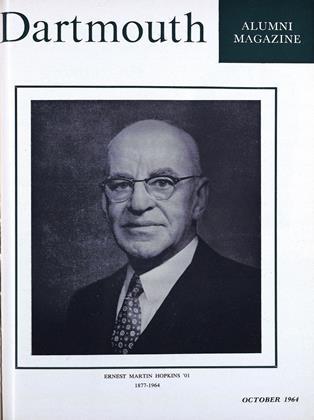By Carlos Baker'32. Nashville, Tenn.: Vanderbilt University Press, 1963. 64 pp. $2.50.
The postwar years have seen the emergence in surprising numbers of that distinct genus in American letters, the professor-poet (or poet-professor); and much fine verse has come from the pens of scholars and teachers. A recent inclusion on this group is Professor Carlos Baker, for years a critic and scholar of distinction and now the author of a volume of poems.
Whatever one might expect, these poems are not particularly "academic" or "scholarly"; only a few find their origins in literature, while most are based on the author's observations and evaluations of experience. Throughout the volume the reader finds Professor Baker returning to his characteristic stance, that of a thoughtful man in a threatening world. He sees men besieged by time, mutability, memory, and dangers and tensions of various kinds: automobiles, for example, are viewed as "oblong murderous monsters with meaningless eyes." There is, the poet insists with reasoned acceptance, a constant need for vigilance and awareness; in return, though time will always win, there may be compensations:
At seven times seven the apple has its worm,Yet there is time, perhaps, for gold to burst,Or stone, like flowers on English walls, toblossom.
It is clear from even a casual reading that Professor Baker responds keenly to the challenges and demands of strict form. Most of the poems in A Year and a Day are either sonnets or rhymed quatrains, and among the others are those rarities in modern verse, a rondeau and a sestina. There is craftsmanship and care in the subdued fluency of these disciplined verses; the book will appeal especially to those who like their poetry restrained, mostly serious, and finely wrought.
Department of EnglishUniversity of Massachusetts
 View Full Issue
View Full Issue
More From This Issue
-
 Feature
FeatureThe Hopkins Administration Steps Forward as a National
October 1964 -
 Feature
FeatureSome Hopkins Views on Higher Education
October 1964 -
 Feature
FeatureA.B.C. Project and Students Both Measure Up to High Expectations
October 1964 -
 Feature
FeatureThe End of a Dartmouth Era
October 1964 -
 Feature
Feature"This Considerate, Friendly Personality"
October 1964 -
 Article
ArticleTHE FACULTY
October 1964 By GEORGE O'CONNELL
ROBERTS W. FRENCH '56
-
 Letters to the Editor
Letters to the EditorA Fluxus Ruckus
December 1992 -
 Article
ArticleWith the D.O.C.
January 1956 By ROBERTS W. FRENCH '56 -
 Books
BooksTHE MEANING OF MODERN POETRY.
MAY 1965 By ROBERTS W. FRENCH '56 -
 Books
BooksRICHARD EBERHART: SELECTED POEMS 1930-1965.
DECEMBER 1965 By ROBERTS W. FRENCH '56 -
 Books
BooksTHIRTY-TWO DARTMOUTH POEMS. Ed.
MARCH 1966 By ROBERTS W. FRENCH '56 -
 Books
BooksWEATHERS AND EDGES.
OCTOBER 1966 By ROBERTS W. FRENCH '56
Books
-
 Books
BooksAlumni Publications
November, 1930 -
 Books
BooksEDMUND NILES HUYCK
January 1936 By A. Howard Meneely -
 Books
BooksTHE WORLD, THE WORLDLESS.
JUNE 1965 By F. CUDWORTH FLINT -
 Books
BooksCHAUCERIAN ESSAYS.
February 1953 By HEWETTE E. JOYCE -
 Books
BooksALL THE BEST IN CENTRAL AMERICA:
June 1946 By J. M. Arce -
 Books
BooksGOLDEN TAPESTRY OF CALIFORNIA
February 1938 By Mildred H. Frye

